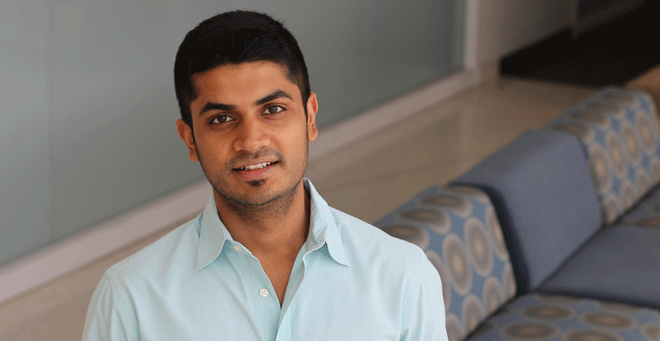 |
|
|
Aditya Venkatesh |
Graduate School of Biomedical Sciences Class of 2016 speaker Aditya Venkatesh will reflect on his path to science when he takes the stage at the 43rdUMass Medical School Commencement on Sunday, June 5. As a child growing up in India, he said he was fascinated by biology and dreamed of becoming a doctor. Later, he decided to pursue a career as a biomedical scientist, reasoning that he could make a bigger difference in more people’s lives.
“I thought by doing research I would be able to directly affect the development of therapeutics and have a more significant impact,” Venkatesh said. “In the future, I want to take it a step further and use the skills I’ve developed at the bench in a different way.”
Venkatesh credits the volunteer opportunities and internships at UMass Medical School with broadening his career, and, again, causing him to rethink his chosen professional path. In his final year as a GSBS student, Venkatesh honed his focus to one that bridges the gap between academia and industry in hopes of expediting the translation of groundbreaking research into therapeutic medicine.
“While graduate school gave me the opportunity to be at the forefront of translational research, and has instilled in me the qualities of analytical and critical thinking, patience and perseverance, I would like to eventually transition to a career where I could play a more active role in translating these research efforts into a therapeutic product,” he said.
When he entered UMass Medical School in 2010 his focus was on cancer research, a decision he made for personal reasons: his grandmother had recently been diagnosed with breast cancer. After participating in several labs during his first year, Venkatesh saw the breadth of research underway at the Worcester campus. He once again found himself at a crossroads, this time choosing to become part of a research team focused on neurodegeneration in the retina in the lab of Claudio Punzo, PhD, assistant professor of ophthalmology and gene therapy.
Through his work in the Punzo lab, Venkatesh discovered a way to make cone cells in the eye more efficient in absorbing nutrients, thereby extending the survival of these cells, and thus delaying the progression of blindness in animal models. His work led to two first-author publications in high-impact journals, Journal of Clinical Investigation and Cell Death and Disease. Dr. Punzo said that the study not only required hard work and dedication, but was also intellectually challenging, and he enjoyed hearing Venkatesh’s explanations of the new data discovered through the course of his experiments.
“He is a driven student, always eager to conduct experiments. He also showed a flair for interacting with other students and researchers. He enjoys helping people, working with people. He’s not a scientist who likes to only sit at his bench conducting experiments, he likes to interact,” Punzo said.
Venkatesh, who has served as a diversity ambassador and mentor during his time at UMMS and who is a classically trained Carnatic musician and vocalist who regularly performs in the metro Boston and New York areas, also recognizes these qualities in himself.
They became particularly apparent during his internship in the Office of Technology Management where Venkatesh helped evaluate the patentability, scientific and commercial potential of new technologies and identify and contact potential commercial partners.
“Academia is where the most innovative research is being accomplished and industry has more resources to translate those findings into drugs and get them to people in need. My time at the technology management office gave me insight into how academia and industry can work together to accomplish this goal,” he said.
Related links on UMassMedNow:
GSBS celebrates student achievement
Improving metabolism prolongs cone cell survival